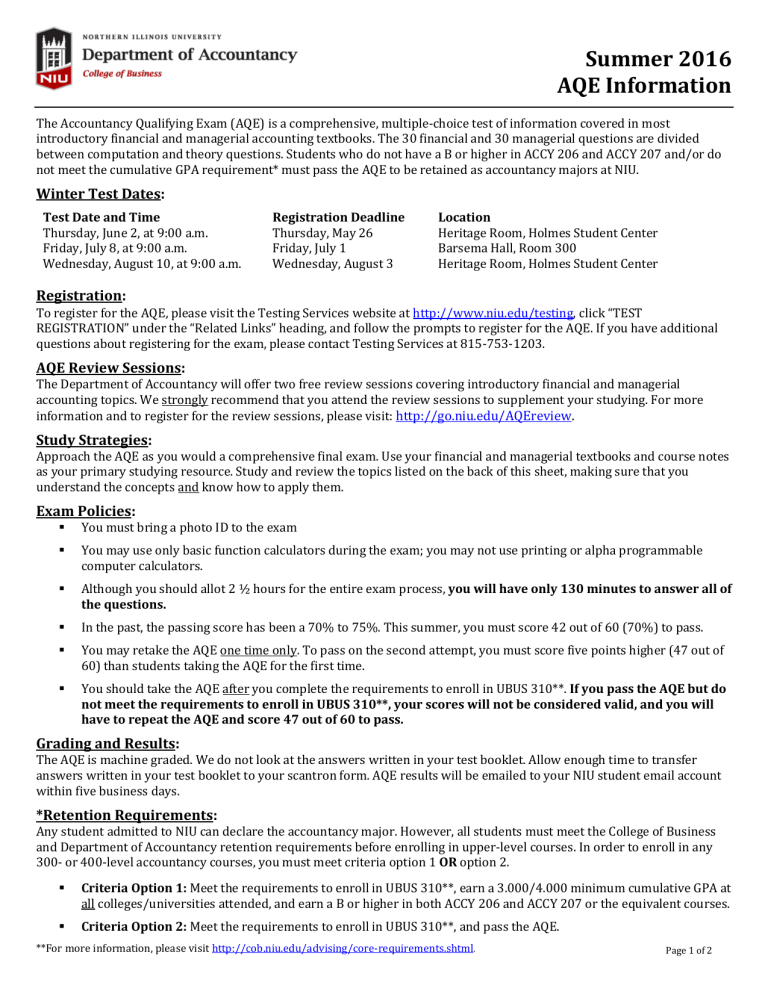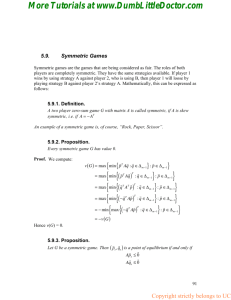Summer 2016 AQE Information

Summer 2016
AQE Information
The Accountancy Qualifying Exam (AQE) is a comprehensive, multiple-choice test of information covered in most introductory financial and managerial accounting textbooks. The 30 financial and 30 managerial questions are divided between computation and theory questions. Students who do not have a B or higher in ACCY 206 and ACCY 207 and/or do not meet the cumulative GPA requirement* must pass the AQE to be retained as accountancy majors at NIU.
Winter Test Dates:
Test Date and Time
Thursday, June 2, at 9:00 a.m.
Friday, July 8, at 9:00 a.m.
Wednesday, August 10, at 9:00 a.m.
Registration Deadline
Thursday, May 26
Friday, July 1
Wednesday, August 3
Location
Heritage Room, Holmes Student Center
Barsema Hall, Room 300
Heritage Room, Holmes Student Center
Registration:
To register for the AQE, please visit the Testing Services website at http://www.niu.edu/testing questions about registering for the exam, please contact Testing Services at 815-753-1203.
, click “TEST
REGISTRATION” under the “Related Links” heading, and follow the prompts to register for the AQE. If you have additional
AQE Review Sessions:
The Department of Accountancy will offer two free review sessions covering introductory financial and managerial accounting topics. We strongly recommend that you attend the review sessions to supplement your studying. For more information and to register for the review sessions, please visit:
http://go.niu.edu/AQEreview
.
Study Strategies:
Approach the AQE as you would a comprehensive final exam. Use your financial and managerial textbooks and course notes as your primary studying resource. Study and review the topics listed on the back of this sheet, making sure that you understand the concepts and know how to apply them.
Exam Policies:
You must bring a photo ID to the exam
You may use only basic function calculators during the exam; you may not use printing or alpha programmable computer calculators.
Although you should allot 2 ½ hours for the entire exam process, you will have only 130 minutes to answer all of the questions.
In the past, the passing score has been a 70% to 75%. This summer, you must score 42 out of 60 (70%) to pass.
You may retake the AQE one time only. To pass on the second attempt, you must score five points higher (47 out of
60) than students taking the AQE for the first time.
You should take the AQE after you complete the requirements to enroll in UBUS 310**. If you pass the AQE but do not meet the requirements to enroll in UBUS 310**, your scores will not be considered valid, and you will have to repeat the AQE and score 47 out of 60 to pass.
Grading and Results:
The AQE is machine graded. We do not look at the answers written in your test booklet. Allow enough time to transfer answers written in your test booklet to your scantron form. AQE results will be emailed to your NIU student email account within five business days.
*Retention Requirements:
Any student admitted to NIU can declare the accountancy major. However, all students must meet the College of Business and Department of Accountancy retention requirements before enrolling in upper-level courses. In order to enroll in any
300- or 400-level accountancy courses, you must meet criteria option 1 OR option 2.
Criteria Option 1: Meet the requirements to enroll in UBUS 310**, earn a 3.000/4.000 minimum cumulative GPA at all colleges/universities attended, and earn a B or higher in both ACCY 206 and ACCY 207 or the equivalent courses.
Criteria Option 2: Meet the requirements to enroll in UBUS 310**, and pass the AQE.
**For more information, please visit http://cob.niu.edu/advising/core-requirements.shtml
. Page 1 of 2
AQE Content:
The following topics may be tested on the AQE:
Financial Topics:
Financial Statements: Balance Sheet, Income Statement, Statement of Cash Flows, Statement of Retained Earnings
Financial Statement Qualities: GAAP Principles and Assumptions
Accounting Information Systems
Accrual Accounting Concepts
Merchandising Operations
Accounting for Assets: Cash, Receivables, Inventory, and Long-Lived Assets
Accounting for Liabilities: Current Liabilities and Bonds
Accounting for Equity: Common Stock, Preferred Stock, Retained Earnings, Treasury Stock, and Dividends
Managerial Topics:
Cost Terms and Concepts
Job Order and Process Costing
Standard Cost and Variance Analysis
Budgeting (Including Flexible Budgeting, Cash, and Capital Budgeting)
Traditional Income Statement vs. Contribution Margin Income Statement
Relevant Costs for Decisions
Cost Behavior and Cost-Volume-Profit Analysis (Break-Even Analysis)
Performance Evaluation (ROI and Residual Income)
TimeValue of Money and NPV
ABC Cost Methods
Sample Questions:
Account analysis question for financial accounting:
The payment of accounts payable results in a(n): a) decrease in liabilities and a decrease in assets b) decrease in liabilities and an increase in assets c) increase in liabilities and a decrease in owners’ equity d) decrease in liabilities and an increase in owners’ equity
Theory question for managerial accounting:
For control purposes, the direct material price variance should be determined at the time: a) of purchase b) of issuance of materials into production c) the production is completed d) the finished product is sold
Additional Study Resources:
The student companion site for Financial Accounting: Tools for Business Decision Making , 7 th edition by Kimmel,
Weygandt, and Kieso: www.wiley.com/college/kimmel . Select a chapter to access self-tests and other materials.
The online learning center for Introduction to Managerial Accounting , 6 th edition by Brewer, Garrison, and Noreen: www.mhhe.com/brewer6e . On the left side of the page, select “student edition.” Then, select a specific chapter from the blue content area to access chapter content, practice quizzes, and more.
Financial topics: Scorebuilder by Baldwin (Available only from the Village Commons Bookstore in DeKalb)
Managerial topics: Quizmaster by Hrubec and Keys (Available only from the Village Commons Bookstore in DeKalb)
www.AccountingCoach.com
is a free website designed to help students learn basic accounting topics.
Page 2 of 2




